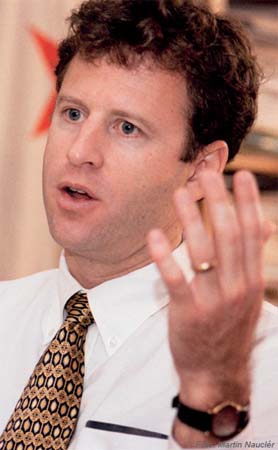
"We need another Iraq Study Group today. A new surge-based strategy is being undertaken in Iraq, involving more American forces and wholly different operational procedures in the field. It is a late hour to try such a strategy, and despite the excellent leadership of Gen. David Petraeus and great work by so many other soldiers and Marines, it will be very difficult to improve the security environment enough now to allow for new political compromise and economic recovery -- and hence real hope. But there is a chance of success. We need to watch what happens, evaluate progress, try to reach some level of national consensus about whether the surge is working and adjust accordingly (perhaps to a radically different strategy involving far fewer U.S. troops) if it does not." Michael O'Hanlon, a Senior Fellow at the Brookings Institute and a Visiting Lecturer at Princeton University, served as a Peace Corps Volunteer in Congo Kinshasa.
Michael O'Hanlon writes: Needed: Study Group II
Needed: Study Group II
By Michael O'Hanlon
March 29, 2007
Last fall, the Iraq Study Group produced a very good study with 79 recommendations, many quite useful. The group, led by former Secretary of State Jim Baker and former Indiana Rep. Lee Hamilton, and including such luminaries as former Defense Secretary Bill Perry, was remarkable for its expertise and sagacity. Among its proposals were expanded training of Iraqi security forces and greater attention to Iraqi jobs creation.
We need another Iraq Study Group today. A new surge-based strategy is being undertaken in Iraq, involving more American forces and wholly different operational procedures in the field. It is a late hour to try such a strategy, and despite the excellent leadership of Gen. David Petraeus and great work by so many other soldiers and Marines, it will be very difficult to improve the security environment enough now to allow for new political compromise and economic recovery -- and hence real hope. But there is a chance of success. We need to watch what happens, evaluate progress, try to reach some level of national consensus about whether the surge is working and adjust accordingly (perhaps to a radically different strategy involving far fewer U.S. troops) if it does not.
According to Miss Rice, Mr. Gates and Gen. Petraeus, it should be possible by summer to see if the strategy has a chance. But to reach objective determinations, we need a group seen as more independent than either officials in the Bush administration or critics on Capitol Hill. That is where an independent group of experts, issuing timely and prominent reports on trends in Iraq every two to three months, could be very useful.
But such a study group requires different membership than the last one. This is hardly a critique of the previous members, who are as accomplished as anyone in the country. My hope and expectation is that they individually remain heavily involved in the Iraq debate. We need their advice, individually and collectively.
However, for all of its virtues, the Iraq Study Group report had a feature that greatly limits its utility in the current context. It oversold the value of getting U.S. combat forces out of Iraq fast. Most important, it suggested doing so by early next year was a real option for the United States -- fully consistent with the hope of an Iraq that gradually stabilizes itself over the coming months and years.
Indeed, the Baker-Hamilton commission suggested committing now to get almost all our combat troops out by next March would improve our prospects for success by forcing the Iraqis to bridge their differences or face likely disaster. Only such a use of American leverage, the Study Group argued, had a chance to force Shia, Sunni Arab, and Kurdish leaders to stop pursuing their sectarian advantages, comfortable in the expectation that the ongoing presence of American forces would prevent the situation from getting fully out of hand.
The Study Group's argument has a kernel of truth. Most Iraqis do indeed continue to pursue sectarian interests above all else, and Americans do need to convey their waning patience with such a situation.
But if Iraqis do listen to our threat to leave, and face the urgency of their situation, the Iraq Study Group would leave them in the lurch. Our economic and military aid might continue, but all our combat forces except those focusing on counterterrorism and protecting the Green Zone and our own troops would come home regardless. This approach does not make much sense.
In other words, there would seem to be an internal contradiction in the Study Group's thinking: The very American leverage it recognizes as crucial to prodding the Iraqis to better governance of their country would be compromised because we would leave Iraq whether they did what we asked or not.
This approach will almost surely not work. It will not work because, even if Iraqis complete their new bill on sharing oil revenue and make other political compromises on issues like amnesty and constitutional revision in the coming months, they will not have the governance capacity to run their country within a year.
Among other problems, security forces will remain fairly weak technically, and extremely fragile politically. When extremely violent acts happen next year, as they surely will with American troops there or not, the Iraqi police and army units will not have the perceived impartiality to handle the situations effectively. They will not be able to gain enough skill in a year to display the necessary proficiency to do their jobs well. Even more to the point, they will not have established the credibility with Iraqis of other sectarian suasions to handle tough situations.
Look at it another way. In the Balkans, we have needed a decade to begin calming things down, and in fact Kosovo is still on edge eight years after Slobodan Milosevic's war. These missions have lasted years after shots stopped being fired.
In Iraq today, hostilities continue, and indeed by the definitions of most, the civil war is now moving into its second full year with no sign of abating. Even in successful peacekeeping missions that have been done "on the cheap" in countries like Cambodia and Mozambique in recent decades, a couple years' international presence were needed to help calm politics and establish confidence in governing authorities.
The Iraq Study Group got this central issue wrong, in my judgment. As such, their recommendation that we can and indeed must leave Iraq by next year does not hold together well. I hope some individual Study Group members will rethink this point in the coming months. But as a group, they are committed to a certain position and would almost surely be unable to reverse it.
As Congress and the president continue down their path toward an ugly confrontation, creation of this type of Iraq task force could be one of the few means of establishing a policy that we can agree on as a nation -- or at least, that we can all tolerate enough be able to pass a supplemental funding bill for our troops through September, something virtually all agree (explicitly or implicitly) is a priority.
None of this will prevent a renewed and likely very contentious debate over funding in the late summer and fall. But if we can find a way to give the surge a chance, yet evaluate it according to demanding and realistic criteria after a few months, we will be doing better as a nation than now.
Michael O'Hanlon is senior fellow at the Brookings Institution.
















